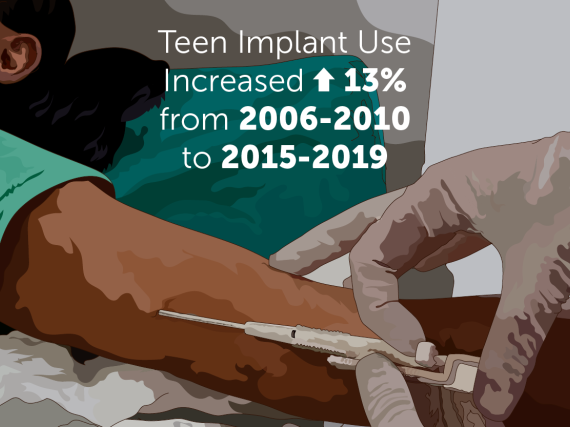Young People and Over-the-Counter Oral Contraception
On July 13, 2023, the FDA approved Opill, one brand of progestin-only oral contraception for over-the-counter (OTC) access without an age restriction. This is exciting news that will expand access to birth control, including for young people.
Multiple studies (e.g., Manksi and Kottke 2015, Grossman et al. 2013) have found that young people are supportive of OTC access and interested in using birth control pills obtained OTC. A survey from 2015 found that 29% of 15-17 year-olds reported they were likely to use an OTC progestin-only pill. A survey of individuals who had used OTC progestin-only pills as part of an actual use trial found that 83% of teens were interested in continuing use. Convenience and ease of access were the most common reasons for wanting to continue the method.
Importantly, an OTC progestin-only pill is safe for adolescents and young adults. Research has found that less than 2% of reproductive-age women had any contraindications (i.e., a medical reason not to take a certain drug) for a progestin-only pill, and other data indicate that adolescents can accurately self-identify contraindications for oral contraception. A recently published pilot label comprehension study, inclusive of teens 12-17 years of age, found that more than 96% understood seven of eight contraindications.
Now that the Opill has been approved for OTC access, data to inform health education and provision of OTC is critical. Power to Decide is leading a qualitative research initiative aimed at better understanding young people’s knowledge and preferences related to OTC contraception. Working with local community partners in Los Angeles, CA, Syracuse, NY, and Jackson, MS, we have conducted eight focus groups to date with 58 pregnancy-capable young people age 15-24 years who identify as Black and/or Hispanic.
Preliminary findings indicate the importance of raising awareness about OTC as an option for birth control access as none of the participants knew the FDA was considering an OTC pill. This finding aligns with data from our Fall 2022 Thanks, Birth Control Survey with young people age 18-29. Participants were asked about the current availability of over-the-counter birth control pills and only one-quarter reported that “the FDA is considering allowing just one type of birth control pill to be available over the counter without a prescription.” From the qualitative research, young people have expressed interest in getting information about OTC birth control pills from OTC pill users, including other young people as well as pharmacists and physicians. Many were interested in receiving information from their health care provider more generally, a finding that aligns with recently published survey research.
Other preliminary qualitative findings from our study include broad support for OTC availability in retail pharmacies, superstores (e.g., Walmart, Target), and grocery stores. Opinions about availability in schools, faith-based institutions, vending machines, and community venues such as nail salons, hair salons, and waxing establishments have been more mixed—some participants have endorsed these locations as useful places to have an OTC pill available. So far there been limited interest in obtaining OTC pills from gas stations or corner stores given concerns about safety (e.g., expired products) and confidentiality.
We’ll be completing data collection and analysis this summer and look forward to disseminating findings from our study to support consumer messaging and implementation of Opill OTC.
For more information about what the science says about OTC progestin-only pills check out this fact sheet from the Society of Family Planning. For information for health consumers and health care providers, please check out answers to frequently asked questions on Bedsider and Bedsider Providers.


